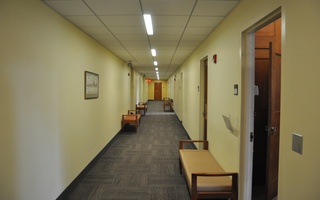A lone printer sits on the second floor of Littauer at the center of an otherwise empty room—breathing space for a department that has long complained about its cramped headquarters. But organizers for a new departmental program behind it hope the room will fill up very quickly.
The room comes courtesy of the recently-formed Lab for Economic Applications and Policy—a rare splurge amidst the University’s belt tightening—which was formed to promote the use of economics research in crafting public policy.
“I want LEAP to be the place policy makers come to get evidence,” said Economics Professor Raj Chetty, who helped found the program as part of his tenure offer at Harvard in 2008.
Funding has been allocated on the order of $1 million from the Faculty of Arts and Sciences—a major contribution, considering the $77 million round of budget cuts this spring. And though it was promised pre-recession, Chetty said the FAS commitment has not changed.
LEAP aims to become the economic department’s laboratory: economic experiments—given short shrift by some because of their relatively high costs—could provide substantive data off of which to base policy, Chetty said. “The basis will be facts.”
The program’s resources, for student and junior faculty research, have also enabled the department to invite visiting faculty to the economics department even as budget troubles have caused FAS to restrict conventional funding for visiting faculty.
Visitors will teach short-term seminars, but Chetty said their presence will be their greatest contribution. The literal proximity of their offices—and those of other Harvard applied economics professors—to the empty room will bring a plethora of great minds together, including students, junior professors, and Harvard’s senior economists, he said.
“I wanted to make sure we had a very interactive environment,” Chetty said.
“The building was designed in a day when professors were silver-haired and secretaries were charged with being dragons to keep away students—and that’s not the world we live in, or want to live in, now,” said Economics Department Chair John Y. Campbell.
The new LEAP initiative is “a small attempt to blast open the walls of Littauer and reduce the sense that it is a prison,” said Economics Professor Claudia Goldin, whose broader renovation plans for Littauer were stymied when the Fine Arts Library was relocated to the building’s ground level last year.
An existing room was expanded and the space painted a light yellow. Though only a printer and mini-fridge now sit in the space, couches and coffee machines are expected to arrive within a month, Chetty said.
After that, he said, it’s just a matter of time until the room fills up.
“A little free food” might help too, he added.
—Staff writer Noah S. Rayman can be reached at nrayman@fas.harvard.edu.
—Staff writer Elyssa A.L, Spitzer can be reached at spitzer@fas.harvard.edu.
Read more in News
Smith Names Mass. Budgetary Chief As FAS Finance DeanRecommended Articles
-
Chetty Accepts Tenure OfferEight years ago, Raj Chetty ’00 graduated from the College summa cum laude, having completed his undergraduate degree in three
-
Economics Professor Wins "Genius Grant"The MacArthur Foundation announced Monday that Harvard economics professor Raj Chetty ’00 has been awarded a 2012 “genius grant” of $500,000 to explore creative passions and to pursue meaningful scholarship.
-
Chetty Awarded Clark MedalHarvard economics professor Raj Chetty ’00 won the John Bates Clark Medal Friday. Awarded by the American Economic Association, the award recognizes the contribution of an American economist under 40 to the field of economics. Chetty, who at 33 is one of the award’s youngest recipients, joins the ranks of famous economists like Lawrence H. Summers, Milton Friedman, Paul R. Krugman, and several Nobel Prize winners who have previously won the award.
-
 At the Margin: Harvard Economics’ Precarious Spot on Top
At the Margin: Harvard Economics’ Precarious Spot on Top -
 Median Family Income for Harvard Undergrads Triple National Average, Study Finds
Median Family Income for Harvard Undergrads Triple National Average, Study Finds













